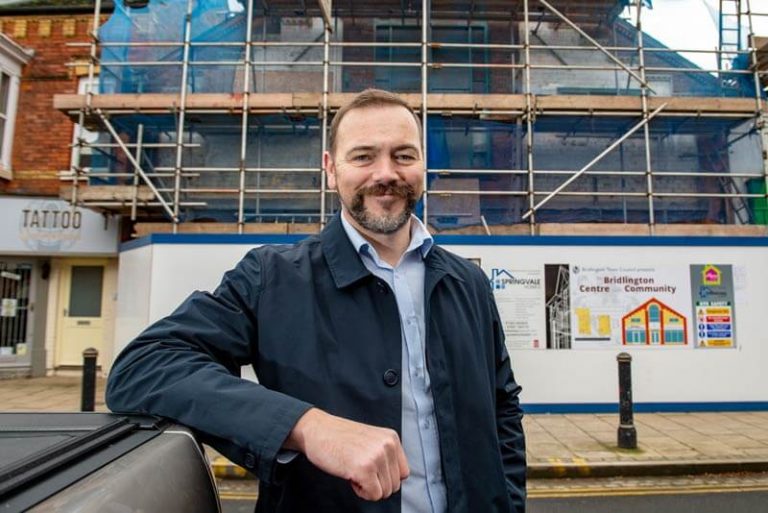Building industry payroll firm sees emerging new HMRC tactic for policing building site employment
Design agency gets new look at its HQ in Caistor
Legal&General agrees final buy-in policy with British Steel Pension scheme
Packed house will hear from Debbie Robinson in Humber Business Week highlight
One of the highlight events of Humber Business Week has already confirmed a full house after tickets were snapped up weeks in advance.
It’s The Elevenses chat between Biz Week founder Paul Sewell and Debbie Robinson, which will be streamed on the Humber Business Week website on Tuesday 6 June.
However, the live session at Sewell Studio on Tuesday 30 May is at capacity with spaces now only available in the event of cancellations. Paul said: “It says everything about the calibre of this guest that every seat was booked weeks ahead. “As Central England CEO and European Vice President of the Co-op, Debbie has to be in Dubrovnik for their conference and that clashes with Biz Week, but she’ll come to us the previous week and I’m looking forward to having a natter with someone who demonstrates that you can have it all – a good marriage, great family, mother and grandmother, athlete and successful businesswoman. “Many women have to choose at some point in their life between career, home, fitness but Debbie has achieved on all fronts.” Debbie comes from Burnley and is a passionate retailer with over 40 years’ experience in the retail sector. Prior to taking on the role at Central England Co-operative in April 2019, Debbie was the UK Managing Director at SPAR. Earlier in her career she has also worked at the Co-op, Marks and Spencer and W H Smith and she is also a board member of the British Retail Consortium, Vice-President of Euro Co-ops, and a member of the advisory panel at Diversity in Retail. Paul brought the Yorkshire International Business Convention (YIBC) to Hull and founded Humber Business Week in 2005. As chair of Sewell Group he works across sectors including construction, property, investments, filling stations and convenience stores. He met Debbie earlier this year during a retail industry visit to Japan and South Korea. He said: “I found her to be a fabulous role model with a wonderful story to tell. She stepped into a role leading a modern, forward-looking organisation employing over 8,000 people and working in food, funeral services, and property investment, with over 400 trading outlets across 16 counties. “Debbie has driven change through her belief in co-operative ethics and values and her advocacy of all aspects of inclusion. She has championed sustainability and Fairtrade, implemented improvements in diet and health including food pack nutritional information, and developed higher standards of animal welfare in the food industry. “Debbie was heavily involved in campaigning which led to better protection for retail workers. She also instigated the launch of a Co-operative International Development Fund to help move global communities out of poverty. “It will be fascinating to talk about how you do these things in an organisation which dates back to the days of Charles Dickens, and how you also find the time to complete 20 consecutive London Marathons!” Elevenses was launched at the 2021 edition of Humber Business Week as a series of informal chats with key figures from business, politics, culture and sport. Guests have included political heavyweights Alan Johnson, Alastair Campbell and Baroness Warsi, broadcaster Steph McGovern and playwright John Godber. Paul said: “I don’t go out looking for guests. I bump into people as I do my day job and if I think they’re right I ask them to come to Hull. We’ve had a lot of fun, illuminating chats over the years. Debbie Robinson has a much lower profile than you would expect. She also has some strong views on all sorts of issues.” The stream will be posted at 11am on Tuesday 6 June. To register visit https://www.humberbusinessweek.co.uk/Law firm raises £250,000 to continue its expansion
Huge net zero boost as carbon storage licences offered for award
Planning consent secured for next phases of Whitehall Riverside scheme in Leeds
Leeds-based property investor, car park and hotel operator, Town Centre Securities PLC (TCS), has secured planning consent for the next phases on the flagship mixed-use Whitehall Riverside development site in Leeds including two office buildings, a 478 space CitiPark car park and a hotel/aparthotel.
The plan forms part of the wider regeneration of the strategically located riverside scheme and could see up to 235,000 sq ft of Grade A, smart and energy efficient office space along with a state-of-the-art, multi storey CitiPark car park and travel hub with renewable energy facility.
The residential component of the masterplan, which is being delivered by Glenbrook and Legal & General, recently commenced on site providing 500 new homes.
Craig Burrow, group property director, TCS said: “After a lengthy process we are pleased to reach this milestone in the project and secure detailed and outline planning consent for the remaining plots.
“Our masterplan has been designed for modern needs, but with flexibility front of mind to adapt to the changing requirements of workspace, residential, electric vehicles, and the visitor economy. It will deliver a truly mixed-use scheme and a unique neighbourhood in the West End of the city which is now enjoying increased activity and development.”
Ben Ziff, Managing Director of CitiPark and TCS board director, said: “As one of the UK’s leading providers of EV charging technology, we are excited to be bringing forward this pioneering, cutting-edge CitiPark multi-storey car park, travel hub and a renewable power facility, and are aiming to progress this early next year.
“This newest and most innovative branch will have the capacity to be the largest EV charging hub in the North of England, and we are confident that this will not only enhance visual impact to this key route into the city, but provide a future proof, sustainable building with value in mind for residents, commuters and visitors to the great city of Leeds.”
Senior team completes management buy out at Leeds packaging firm
KCOM boss urges business conference to run event in Hull
Hull-based KCOM is backing the city as the ideal place for investment as a major national business conference.
Speaking at The UK’s Real Estate Investment & Infrastructure Forum in Leeds, company CEO Tim Shaw Mr Shaw said: “As a company with deep roots in the region we know what a fantastic place it is to for businesses to invest and thrive. With a supportive local authority, our world leading full fibre infrastructure, a great pipeline of tech-savvy talent coming through from local colleges, affordable housing and high standard of living, I’d urge all investors to take a closer look at Hull.” Hull City Council welcomed KCOM’s participation in the event saying the broadband provider’s commitment to the region showed how private investment in the region could flourish. Alex Codd, Hull City Council’s assistant director for economic development and regeneration, said: “We’re really looking forward to attending UKREiiF next week. It’s a fantastic opportunity to showcase what we have in Hull and what we have to offer for potential investors. “One of our unique selling points is being the first fully connected city and that was made possible by KCOM building a world-class full fibre broadband network in Hull.” The three-day event, which is being held at the Royal Armouries in Leeds, is attended by 6,000 delegates including 1,500 investors and developers. The Forum is supported by a high number of regional combined authorities, local councils and Government departments – as well as the largest developers and investors from across the UK and internationally. This event aims to gather all the key players, influencers and decision makers within the investment and real estate sectors to highlight investment and development opportunities in cities such as Hull, while creating new relationships to drive economic growth through development and regeneration. Founded in 1904, KCOM is one of Hull’s largest local employers and has invested around £200m in the area’s full fibre broadband network in the past decade and continues to play a leading role in the local community.











